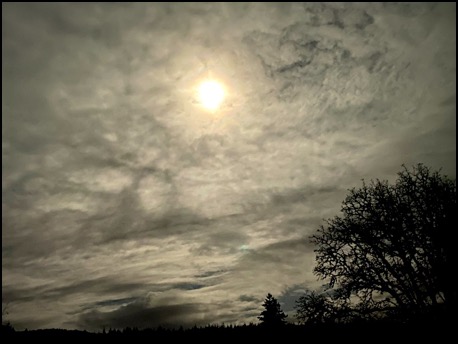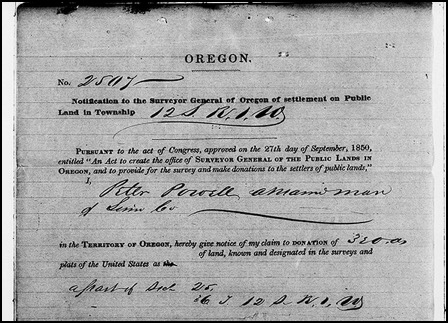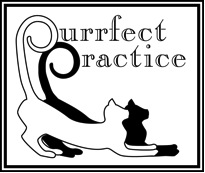Current Affairs
Cold Moon December 2024
15/12/24 08:35
Earlier this morning, the last full moon of the 2024 year showed itself. Two mornings in a row to see the moon and sky about 4 a.m. A big change from the inversion layer we had in recent weeks. It is nice to see some sky.
I was able to get a picture out the window of the "Cold Moon" of December. Very eerie what with the the dark bare tree limbs that are outlined by the lighted sky. A setting for a horror movie.

I was able to get a picture out the window of the "Cold Moon" of December. Very eerie what with the the dark bare tree limbs that are outlined by the lighted sky. A setting for a horror movie.

Comments
Notre Dame Cathedral Reopens
09/12/24 09:37
The almost 800 year old Notre Dame Cathedral had a devastatingly damaging fire about 5 1/2 years ago. After much debate, the cathedral was rebuilt in the same architectural style as it had been previously plus fire control measures. The result is beautiful and striking. The reopening was held 2 days ago in Paris and many world leaders were present. The following is a Getty Image of the rebuilt cathedral.


A Black Moon
26/11/24 09:38
From the Epoch Times, "the blue moon being the second full moon of a single month. The black moon, on the other hand, is a second new moon appearing in the same month.
“In the new moon, the moon is in between the earth and the sun,” said Jim Todd, OMSI’s Director of Space Science Education. “And the only way you can see the new moon, is during the solar eclipse like in 2017. That’s why we don’t see it. That’s why it’s defined as black.”
“So every month, we have a new moon, because it goes around the Earth 29 and a half days. That’s called the lunar cycle. So every month we have a new moon. This month, because of the calendar system, we have two that falls on the calendar system,” he said. “And so that means the lunar cycles goes around the Earth 13 times in one year, and every month we have a new moon. Timing is everything.”
The Black Moon is due to occur on November 30. The rest of the world will experience the Black Moon on December 1 and 30th.
“In the new moon, the moon is in between the earth and the sun,” said Jim Todd, OMSI’s Director of Space Science Education. “And the only way you can see the new moon, is during the solar eclipse like in 2017. That’s why we don’t see it. That’s why it’s defined as black.”
“So every month, we have a new moon, because it goes around the Earth 29 and a half days. That’s called the lunar cycle. So every month we have a new moon. This month, because of the calendar system, we have two that falls on the calendar system,” he said. “And so that means the lunar cycles goes around the Earth 13 times in one year, and every month we have a new moon. Timing is everything.”
The Black Moon is due to occur on November 30. The rest of the world will experience the Black Moon on December 1 and 30th.
What Is A Name
16/03/24 09:21
What is a name? My great-great-great grandparents moved from east Tennessee to Missouri and then on the Oregon Trail in 1853 here to the Willamette Valley of Oregon near Lebanon.
Their name was Powell, Joab and Anne, and they had 14 children, all who were living came with them to Oregon.
Yesterday I saw a description of the derivation of Powell. This is similar to family history information.
The Powell's surname is Welsh in origin, not Irish. It is derived from the Welsh name Hywel, with the Welsh prefix ap appended at the start in the same way Mac or O would be in other parts of the Celtic realm, indicating son of. The name Hywel means, we are told, something like eminent.
Their name was Powell, Joab and Anne, and they had 14 children, all who were living came with them to Oregon.
Yesterday I saw a description of the derivation of Powell. This is similar to family history information.
The Powell's surname is Welsh in origin, not Irish. It is derived from the Welsh name Hywel, with the Welsh prefix ap appended at the start in the same way Mac or O would be in other parts of the Celtic realm, indicating son of. The name Hywel means, we are told, something like eminent.
Why Has Handwriting Disappeared
22/03/23 14:05
I have been researching the deeds for our property over 170 years and 5 generations. First one needs to go to the tax office at the County Courthouse for a description. Then you take this document to the County Clerk's office to go through the Deed Books and microfiche over the years based on looking for the Direct (grantor) or Indirect (grantee) party involved. There are probably over 50 large books with lined pages covering each deed transaction written in the most clear yet distinctly beautiful cursive handwriting. This form of writing is not seen often today. Many cannot write in script at all. What a potentially lost art. Maybe it is coming back?
A history of what has happened to cursive handwriting with the use of technology such as tablets and computers.
Good penmanship was long considered a status symbol, in that it meant one had the wealth, privilege, and time to access education. The ancient Romans borrowed aspects of the Etruscan alphabet to create one of the earliest forms of written script for transactions and correspondence. In the late eighth century, Charlemagne instructed an English monk to standardize the craft of penmanship, which resulted in Carolingian minuscule, a form of writing that crept closer to modern script. A heavier typeface reigned supreme upon the invention of the printing press in the mid-15th century, but Italian humanists revolted by creating an even more elegant handwriting style, known as “italic.” This became such a status symbol that, by the 1700s, some writing schools emerged in the American Colonies. At Boston schools such as the Latin School and the Writing School in Queen Street — where subjects included spelling, reading, writing, arithmetic, and the catechism — there was a heavy focus on penmanship and different forms of ornamental script and calligraphy.

Script on Peter Powell Donation Land Claim document
A history of what has happened to cursive handwriting with the use of technology such as tablets and computers.
Good penmanship was long considered a status symbol, in that it meant one had the wealth, privilege, and time to access education. The ancient Romans borrowed aspects of the Etruscan alphabet to create one of the earliest forms of written script for transactions and correspondence. In the late eighth century, Charlemagne instructed an English monk to standardize the craft of penmanship, which resulted in Carolingian minuscule, a form of writing that crept closer to modern script. A heavier typeface reigned supreme upon the invention of the printing press in the mid-15th century, but Italian humanists revolted by creating an even more elegant handwriting style, known as “italic.” This became such a status symbol that, by the 1700s, some writing schools emerged in the American Colonies. At Boston schools such as the Latin School and the Writing School in Queen Street — where subjects included spelling, reading, writing, arithmetic, and the catechism — there was a heavy focus on penmanship and different forms of ornamental script and calligraphy.

Script on Peter Powell Donation Land Claim document
The Man Most Needed
22/02/23 12:06
Today is the anniversary of George Washington's Birthday. It comprises a holiday with Lincoln's birthday earlier to make up President's Day holiday. Washington's reputation has taken hits in recent years. He is thought in the opinion of this blogger the most needed or indispensable man for his time as a military leader then President. He gave up the power of being king as some of his contemporaries wished him to be, to resign and retire to his home on the Potomac.
Here is more information from a blog article from Powerline.
Today we celebrate the anniversary of the birth of George Washington. Of all the great men of the revolutionary era to whom we owe our freedom, Washington’s greatness was the rarest and the most needed. At this remove in time, it is also the hardest to comprehend.
Take, for example, Washington’s contribution to the Constitutional Convention of 1787. Washington’s mere presence lent the undertaking and its handiwork the legitimacy that resulted in success. The convention’s first order of business was the election of a presiding officer. Washington was the delegates’ unanimous choice.
Here is more information from a blog article from Powerline.
Today we celebrate the anniversary of the birth of George Washington. Of all the great men of the revolutionary era to whom we owe our freedom, Washington’s greatness was the rarest and the most needed. At this remove in time, it is also the hardest to comprehend.
Take, for example, Washington’s contribution to the Constitutional Convention of 1787. Washington’s mere presence lent the undertaking and its handiwork the legitimacy that resulted in success. The convention’s first order of business was the election of a presiding officer. Washington was the delegates’ unanimous choice.
Boris Pasternak Sonnet
21/02/23 15:09
Douglas Murray, one of my favorite current writers and historian, is posting over the next year a column on Free Press with Bari Weiss. Murray did an excellent video series called Uncancelled. This current column started off well. He focused on Boris Pasternak, an excellent Russian author, who lived in Stalinist times and survived.
Here is the story of his reply of one number, 30, and how it likely saved his life and energized other Russians who understood the meaning. There is more to his article and story of this Shakespeare sonnet…
Two foundational stories stick in my own mind. I will tell the second one next week, but I will start with an event that took place in Moscow in 1937.
That year’s annual Soviet writers’ congress took place in the worst time of the purges. At the major show trials in Moscow, people were confessing to things they could not possibly have done. Both the journalist Malcolm Muggeridge and the author Fitzroy Maclean, who observed these events, were credited with the line “I can believe everything except the facts.”
The people who got public show trials were comparatively lucky: at least the absurdity of the excuse for their murder was made public. Other people disappeared all the time with nothing heard of them again.
It was a dangerous time to be a private citizen, but an even worse time to be a public one. So the writers’ congress that year included a lot of very dull, regime-prescribed speeches praising the virtues of Leninist–Stalinism, Stalinist–Leninism, and so on. It was the sort of occasion to which all artists were subjected through that era: a ritual of forced humiliation. A way of getting everyone to collude in the world of lies.
Boris Pasternak was one of the most famous writers in the country. Though he had not yet completed Doctor Zhivago—the novel that would make him internationally famous—in that hall, that year, everybody knew him. And Pasternak faced a challenge. He could not speak, and he couldn’t not speak. Stalin’s secret police chief Lavrentiy Beria and his men were literally standing by the side of the stage. If Pasternak spoke, he could be disappeared. If he didn’t speak, he could be disappeared. So he stayed silent. It was on the third and final day of the conference that the writer’s friends persuaded him that the silence was madness. He had to speak. So finally, Pasternak got up to the lectern.
Everybody knew who he was, of course. He was tall, and strikingly handsome. As he pulled himself up to his full height he said not a word but a number. The number was “30.” As he said it, all two thousand writers in the hall got to their feet, and—with Pasternak—began to recite.
Thirty is the number of the Shakespeare sonnet beginning, “When to the sessions of sweet silent thought I summon up remembrance of things past.” Today the line may be best known for giving C. K. Scott Moncrieff the title for his English translation of Proust’s masterpiece about lost time. But the Russian writers in that hall all knew Pasternak had himself done a translation of the sonnet into Russian. It was already a classic. Those who know his translation say it is as beautiful as the original.
Here is the story of his reply of one number, 30, and how it likely saved his life and energized other Russians who understood the meaning. There is more to his article and story of this Shakespeare sonnet…
Two foundational stories stick in my own mind. I will tell the second one next week, but I will start with an event that took place in Moscow in 1937.
That year’s annual Soviet writers’ congress took place in the worst time of the purges. At the major show trials in Moscow, people were confessing to things they could not possibly have done. Both the journalist Malcolm Muggeridge and the author Fitzroy Maclean, who observed these events, were credited with the line “I can believe everything except the facts.”
The people who got public show trials were comparatively lucky: at least the absurdity of the excuse for their murder was made public. Other people disappeared all the time with nothing heard of them again.
It was a dangerous time to be a private citizen, but an even worse time to be a public one. So the writers’ congress that year included a lot of very dull, regime-prescribed speeches praising the virtues of Leninist–Stalinism, Stalinist–Leninism, and so on. It was the sort of occasion to which all artists were subjected through that era: a ritual of forced humiliation. A way of getting everyone to collude in the world of lies.
Boris Pasternak was one of the most famous writers in the country. Though he had not yet completed Doctor Zhivago—the novel that would make him internationally famous—in that hall, that year, everybody knew him. And Pasternak faced a challenge. He could not speak, and he couldn’t not speak. Stalin’s secret police chief Lavrentiy Beria and his men were literally standing by the side of the stage. If Pasternak spoke, he could be disappeared. If he didn’t speak, he could be disappeared. So he stayed silent. It was on the third and final day of the conference that the writer’s friends persuaded him that the silence was madness. He had to speak. So finally, Pasternak got up to the lectern.
Everybody knew who he was, of course. He was tall, and strikingly handsome. As he pulled himself up to his full height he said not a word but a number. The number was “30.” As he said it, all two thousand writers in the hall got to their feet, and—with Pasternak—began to recite.
Thirty is the number of the Shakespeare sonnet beginning, “When to the sessions of sweet silent thought I summon up remembrance of things past.” Today the line may be best known for giving C. K. Scott Moncrieff the title for his English translation of Proust’s masterpiece about lost time. But the Russian writers in that hall all knew Pasternak had himself done a translation of the sonnet into Russian. It was already a classic. Those who know his translation say it is as beautiful as the original.
Mystery Crime Likely Solved
30/12/22 18:56
On November 13, 2022, four University of Idaho students (3 women, 1 man) were found stabbed to death in their house located in Moscow, ID. Moscow is a small town or city and located about 10 miles east of where I spent 6 years attending college at Washington State University. This was a particularly heinous crime and unusual for such a close, small town. For several weeks since, the police and FBI have not seemed to have any suspects in view. Today they had a press conference announcing the arrest of a PhD student (with Washington State University with an apartment in Pullman, WA) at the home of his parents in eastern Pennsylvania near the Poconos Mountains. They live in a gated quiet community. This home is over 2500 east of Moscow. The police also confiscated it appears a white Hyundai Elantra sedan that they were looking for as a clue from video captured around the time of the murders. The suspect is 28 years of age and is studying criminal justice named Bryan Kohberger. He looks a bit like Ted Bundy. The police feel they have caught their perp who killed these four young wonderful students. Time will give us more detail on how his arrest came about and possibly how the crime was committed. Familial DNA and the car were some of the clues that lead to his arrest.
Uncancelled History With Douglas Murray
24/12/22 07:41
I am enjoying a series of podcasts on YouTube presented by Douglas Murray on history's famous figures whose legacies are being questioned and cancelled. Murray is a wonderful speaker who is pithy and knowledgeable on his subjects. He is genuinely interested in exploring the histories of these figures with some of the most well-known historians known today.
Murray described why his is doing the series in an article in the New York Post. A portion of this explanation is included below:
What is worst is that they have done this to our nation’s heroes. Every single one of them.
So earlier this year I decided to try to make my own small effort at hitting back. I do not have the resources of the New York Times at my disposal, but I got a team of the best young technicians and researchers and put together a list of the American figures who have been most maligned in recent years. I am sorry to say the initial list was very long. It would have been easier to create a list of American heroes who had not been lied about in recent years.
But in the end we decided to focus on the absolutely central figures. The Founding Fathers, Christopher Columbus, Abraham Lincoln, Teddy Roosevelt and more. Throughout the course of this year I have been sitting down with some of America’s — and the world’s — leading historians to fill in the gap of ignorance that has been deliberately inserted into American society.
We called it “Uncancelled History” and you can listen to it on all podcast channels and watch each hour-long episode for free on YouTube among other places. I hope it will be a great learning resource. I am very proud of the results.
Murray described why his is doing the series in an article in the New York Post. A portion of this explanation is included below:
What is worst is that they have done this to our nation’s heroes. Every single one of them.
So earlier this year I decided to try to make my own small effort at hitting back. I do not have the resources of the New York Times at my disposal, but I got a team of the best young technicians and researchers and put together a list of the American figures who have been most maligned in recent years. I am sorry to say the initial list was very long. It would have been easier to create a list of American heroes who had not been lied about in recent years.
But in the end we decided to focus on the absolutely central figures. The Founding Fathers, Christopher Columbus, Abraham Lincoln, Teddy Roosevelt and more. Throughout the course of this year I have been sitting down with some of America’s — and the world’s — leading historians to fill in the gap of ignorance that has been deliberately inserted into American society.
We called it “Uncancelled History” and you can listen to it on all podcast channels and watch each hour-long episode for free on YouTube among other places. I hope it will be a great learning resource. I am very proud of the results.
This War Continues
04/03/22 07:51
I need to get into the nature of posting in this blog more frequently. It is comforting to have this functioning better though it would help if we had a faster speed to our internet and it would be more stable.
Now on to the current state of the war of Russia on the Ukraine. Ukraine has slowed down the military progress of Russia encircling parts of Ukraine and declaring victory. We are likely in for some very serious times ahead. This is a significant war that has so many undertones and nuances plus past history. This probably will not end well for a number of countries and also regions, including the U.S. and Europe. Russia looks to weaken the West and be the power it was before 1991 when it was essentially broken apart. Today, Russia's army has taken over the largest nuclear power plant in Europe which is in the southern part of Ukraine. Will this be used to blackmail the West? Times are uncertain.
A good article by a blogger with a lot of pragmatic views and there are lots of comments and a link to a Claire Berlinski substance article in the midst. A lot to ponder, worry, and monitor.
<<The article (the Russian press article declaring victory which has not happened and has been removed from its February 26th posting) dovetails with things Putin has been saying and doing for years, which is another reason I believe it’s for real and that it expresses his actual goals: not just to regain the old Russian empire, but – as Khrushchev once famously said – of burying us.
Remember Nineteen Eighty-Four? To paraphrase, “If you want a picture of the future [of Ukraine and all other countries Russia conquers], imagine a boot stamping on a human face— forever.”
Remember, too, that although Orwell’s book was set in England, it was modeled after what Orwell knew of the Soviets. Putin isn’t a Marxist, but he has the same devotion they had to subjugating those who might want autonomy. Don’t forget also that before he was a politician, Putin was a KGB guy. >>
Now on to the current state of the war of Russia on the Ukraine. Ukraine has slowed down the military progress of Russia encircling parts of Ukraine and declaring victory. We are likely in for some very serious times ahead. This is a significant war that has so many undertones and nuances plus past history. This probably will not end well for a number of countries and also regions, including the U.S. and Europe. Russia looks to weaken the West and be the power it was before 1991 when it was essentially broken apart. Today, Russia's army has taken over the largest nuclear power plant in Europe which is in the southern part of Ukraine. Will this be used to blackmail the West? Times are uncertain.
A good article by a blogger with a lot of pragmatic views and there are lots of comments and a link to a Claire Berlinski substance article in the midst. A lot to ponder, worry, and monitor.
<<The article (the Russian press article declaring victory which has not happened and has been removed from its February 26th posting) dovetails with things Putin has been saying and doing for years, which is another reason I believe it’s for real and that it expresses his actual goals: not just to regain the old Russian empire, but – as Khrushchev once famously said – of burying us.
Remember Nineteen Eighty-Four? To paraphrase, “If you want a picture of the future [of Ukraine and all other countries Russia conquers], imagine a boot stamping on a human face— forever.”
Remember, too, that although Orwell’s book was set in England, it was modeled after what Orwell knew of the Soviets. Putin isn’t a Marxist, but he has the same devotion they had to subjugating those who might want autonomy. Don’t forget also that before he was a politician, Putin was a KGB guy. >>
A Return to War in Ukraine
26/02/22 14:03
In earlier times of this blog, such as in 2014, I wrote about the history of Eastern Europe and a war by Russia on Ukraine. This history of war goes back decades, centuries even. I mostly discussed the history of the 1930's and 40's brought about by Stalin's policies and control over the Ukraine being called the Holodomor.
There has been more recent interactions and history between the countries, in particular as the Soviet Union broke apart and Ukraine became a separate country with some aspect of democracy at the edge of Russia. Putin, the leader of Russia, sees now an opportunity to bring Ukraine back under their control and build further the prior influence of Russia over its vassal countries like as the Soviet Union.
This is a sad and alarming situation. The Ukrainian people are good people and are not looking for war. People will fight though and are dying. Some are fleeing the country. Some articles found in Tablet Magazine give a sense of what is happening: Lee Smith is a very good writer and has explained how he sees this war came about. Bernard Henri-Levy also writes about Putin and this unbelievable situation. So much feels like a return to the 1930's.
For more knowledge and good literature, I recommend these authors and books:
Robert Conquest - Harvest of Sorrow
Timothy Snyder - Bloodlands, Europe between Hitler and Stalin
Anne Applebaum - Red Harvest, Stalin's War on Ukraine
There has been more recent interactions and history between the countries, in particular as the Soviet Union broke apart and Ukraine became a separate country with some aspect of democracy at the edge of Russia. Putin, the leader of Russia, sees now an opportunity to bring Ukraine back under their control and build further the prior influence of Russia over its vassal countries like as the Soviet Union.
This is a sad and alarming situation. The Ukrainian people are good people and are not looking for war. People will fight though and are dying. Some are fleeing the country. Some articles found in Tablet Magazine give a sense of what is happening: Lee Smith is a very good writer and has explained how he sees this war came about. Bernard Henri-Levy also writes about Putin and this unbelievable situation. So much feels like a return to the 1930's.
For more knowledge and good literature, I recommend these authors and books:
Robert Conquest - Harvest of Sorrow
Timothy Snyder - Bloodlands, Europe between Hitler and Stalin
Anne Applebaum - Red Harvest, Stalin's War on Ukraine
Comet NEOWISE
19/07/20 06:56
It was a beautiful, clear evening to see the stars last night. They were outstanding. Currently, there is a comet visible about 60-80 minutes seen after sundown for this month into August. It is Comet NEOWISE and won't be seen again here for more than 6800 years in the future. One has to look in the Northwest sky below Ursa Major just above the horizon. We could view it with our binoculars. How cool is that. More detail on the comet here.
A picture from the article here:

A picture from the article here:


